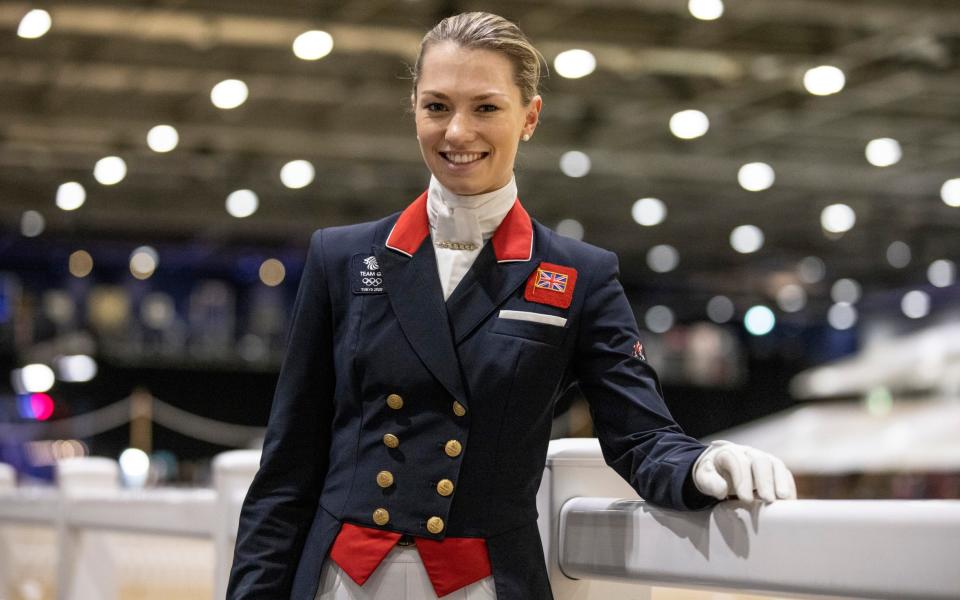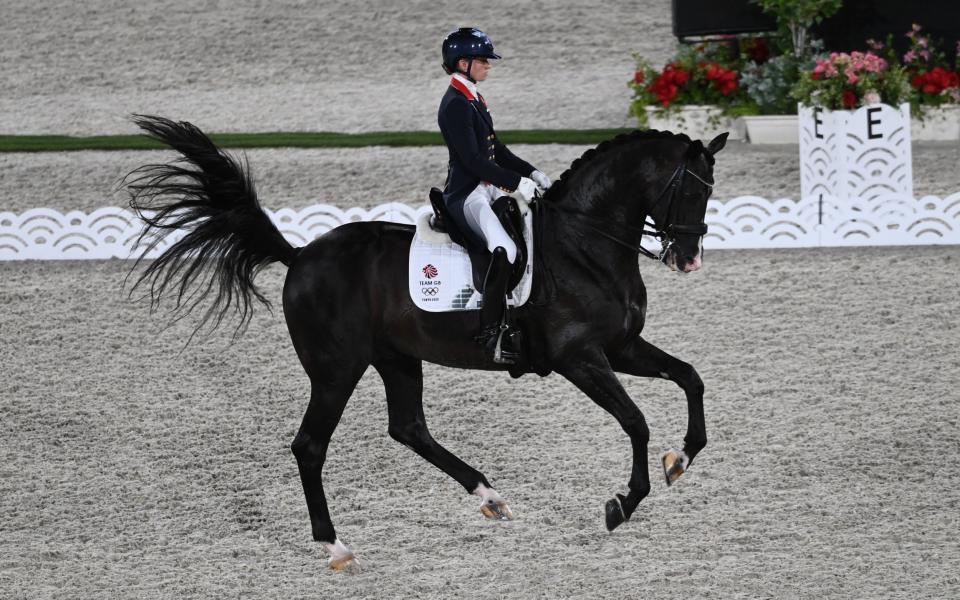How Charlotte Fry defied tragedy to become Britain’s new dressage queen

She is Britain’s new dressage queen, an absurdly gifted young rider who has returned from the World Equestrian Games laden with prizes after a week which has catapulted her into the stratosphere of her sport.
And yet it is not the three medals - one silver and two gold - that occupied pride of place around Charlotte Fry’s neck in Denmark. That was taken by the locket containing a picture of her mother Laura, a renowned dressage rider herself, who died of breast cancer in 2012. She was 45.
Charlotte was only 16 at the time, just embarking on a career which has now seen her ordained as the heir apparent to Charlotte Dujardin, the triple Olympic gold medallist who stands alone as the country’s most successful female dressage rider. But in those dark days after her mother’s death, it was her love of horses that pulled her through.
“That time is a blur for me,” she told The Telegraph last year. “Mum was ill for a while before she died. I just remember riding more and more every day to help me get through it. I had just started sixth form and that didn’t go well, I was focusing all my attention on riding and had decided I wasn’t going to do anything other than horses anyway. But I always think of her when I’m competing.”
Fry was immersed in dressage from infancy - hardly a surprise given Laura’s stellar career as a rider and trainer, which included competing at the Barcelona Olympics in 1992. She credits her mother as nurturing her love of the sport.
“I remember going to lots of big shows with her as a child - as a baby she would park me in a pram by the side of the arena,” she recalled. “I would take any chance I could to go with her and she trained me every day. She taught me to ride and guided me right until I was 16, so a lot of what I have learnt is from her. I loved her work ethic: she would be in the yard at 5am and finish late in the evening and I am the same. I just love being around the horses”

Carl Hester, an Olympic gold medallist in his own right, would attest to that. He has known Fry all her life, having coached her mother with her daughter frequently watching on from close quarters.
Laura was Hester’s team-mate in Barcelona but also a dear friend and he took her daughter under his wing after she died. Fry would spend time in the school holidays at Hester’s yard, working in exchange for lessons.
“The plan was that I would go and work for him when I left school,” Fry said, “but at that stage he already had Charlotte [Dujardin] and he said: ‘I only have room for one Charlotte in my yard!’ Instead he found me this really good opportunity with his friend in Holland.”
The opportunity turned out to be Fry’s golden ticket. At the age of 18, having previously never left home, she headed to Holland, to the base of Danish Olympic dressage rider Ann Van Olst who specialises in breeding and training top dressage horses. Van Olst is the owner of Glamourdale, the brilliant black stallion Fry rode in the freestyle event in Herning on Wednesday, breaking the 90-point barrier in the process - and the rest of her talented team of horses.
For Hester, it was a poignant sight. “It is a bittersweet pill, because I think if Laura hadn’t died, Charlotte would never have gone to Holland,” he tells The Telegraph. “He knew her family couldn’t afford to buy the horses at that level so she had to go there to get rides on these sorts of horses.

“The prospect must have been daunting for her - not only have you lost your mother but you have to go abroad to get this opportunity, but she never hesitated. She was so fragile and young, so she really deserves every bit of the success she has achieved.”
Dressage is an art form as much as a sport, requiring the rider to communicate with their horse on an almost telepathic level as they choreograph a highly complex set of dance moves to music. To add to the difficulty, Herning was perhaps the most raucous crowd a dressage rider will ever experience - 11,000 Danes treating the occasion more like a football match than an equestrian championships.
“Lottie is so petite and she rides this big black stallion who is so full of power but she captures everything about dressage,” Hester says. “It’s not about strength and force, it’s about lightness, harmony and elegance and they have all of that.
“To ride in a country where the home nation is favourite and somehow get them on your side shows how much she appeals to the public. Her face is the most determined I’ve seen in sport and the minute she rides up the centre line her smile lights up the stadium.”
Charlotte, who also claimed Grand Prix gold and team silver earlier in the week, spoke of her win on Wednesday being the “most incredible feeling in the world”, but dressage has a habit of bringing its competitors back to earth with a bump: the morning after her triumph, she was packing up her horse box, ready for the 10-hour drive back to Holland.
There is little doubt, however, that British riding has its new star. “There is no fear in this girl - I think she could break records,” Hester added. “Moments like these must be emotional, but what she is very good at is that she never looks back. Her mum would be so proud of her.”

 Yahoo Sport
Yahoo Sport 





































